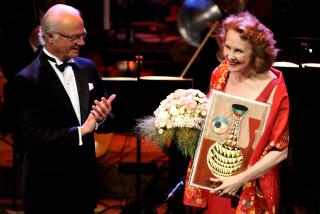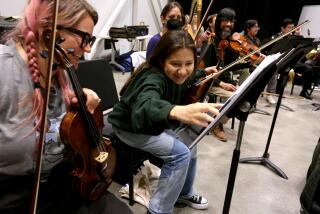Violinist Daniel Hope champions Nazi victims
- Share via
Describing violinist Daniel Hope is no easy task.
There is first the matter of his nationality. The musician was born in South Africa, raised in England and now travels with an Irish passport even though he makes his home in Hamburg, Germany.
Hope is a much in-demand soloist these days, but the violin isn’t his only vocation. He devotes significant time to climate-change causes and is a published author with two books under his belt -- one about concert-going etiquette and another about his family, which he wrote in German.
Perhaps his most passionate activity -- and the one that brings him to L.A. this week -- is his fascination with composers whose careers suffered at the hands of the Nazi Party.
On Wednesday at UCLA’s Schoenberg Hall, Hope will perform a concert of pieces by Erwin Schulhoff, a Czech composer who died at a concentration camp in Bavaria in 1942. The free concert, which will feature members of the Los Angeles Chamber Orchestra, will include Schulhoff’s Sonata No. 2 for Violin and Duo for Violin and Cello. (E-mail olga@orel foundation.org to request tickets.)
“The music, regardless of the story connected to it, is powerful,” Hope said recently. “You don’t have to know the story but it makes it richer if you do.”
Schulhoff was a composer who showed great promise but found that his life and career were in danger after the German occupation of Czech territory. The composer, who was both Jewish and a communist, applied for Soviet citizenship with the aim to emigrate. But he was eventually arrested and imprisoned by the Nazis.
His music contains a multitude of influences, including modernism and even jazz. “He was one of the first composers to incorporate jazz elements. Very few composers can manage the synthesis,” Hope said.
Wednesday’s concert is being co-organized by the Orel Foundation, an organization that seeks to spotlight music by composers whose careers were impacted by the cataclysmic events of the mid-20th century.
Hope said his interest in music from the period stems from an incident about 15 years ago when he was driving and heard a string trio on the radio.
“I pulled over to hear the name of the composer -- it was Gideon Klein,” Hope recalled. “I didn’t know who he was and I Googled it when I got back home.”
And so was born a new personal obsession. Since then, he has organized concerts and programs around the world to showcase music by composers including Schulhoff, Klein and Hans Krasa. Hope said part of his motivation is genetic -- his grandparents were German Jews who were “kicked out of Germany and fled in a variety of directions.”
Hope began playing the violin at age 4 after his family relocated from South Africa to London. Hope’s father had difficulty finding work, and the family was running out of money. Hope’s mother took a job as a secretary for violinist Yehudi Menuhin and ended up working for him for more than 20 years.
Hanging around the office with his mother prompted Hope to take up the instrument. “I simply announced I wanted to be a violinist,” he said. “Neither of my parents were musicians. But I guess I had a strong will.”
Hope, 35, spends much of the year traveling for concerts, festivals and recordings. (He said he’s married but has no children.) Recent projects include a video blog on his official website, where he chronicles his international travels, including a meeting with pop star Sting and a performance at Berlin’s Reichstag.
On Tuesday, Hope is scheduled to teach a master class at USC that is open to the public. Later this year, he will perform in a climate change concert for the Prince of Wales’ Rainforests Project.
Hope will also continue to work on book projects. “My father was a writer, and I was encouraged to express my opinions,” he said. “It’s challenging but we need people to discuss classical music all the time.”
More to Read
The biggest entertainment stories
Get our big stories about Hollywood, film, television, music, arts, culture and more right in your inbox as soon as they publish.
You may occasionally receive promotional content from the Los Angeles Times.











